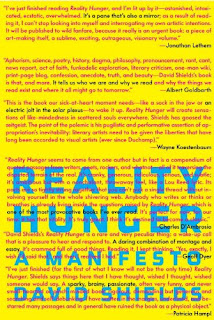This past Wednesday students from Hamline met to discuss David Shields’ newest book, Reality Hunger: A Manifesto under the moderation of professor Barrie Jean Borich. In the spirit of the book, I am posting quotes from the evening, some of which are verbatim and some of which I edited for clarity, context, or simply because I didn’t catch the full phrase. I didn’t include everything, and they aren’t necessarily in order, but unlike Shields, I believe attribution is important so I’ve used the students’ first names. And I apologize if I misquoted someone.
I think it’s a defensive lyric essay via an attack on narrative fiction.
Loren
I would add that it is a personal manifesto or manifestation of what is a viable genre/nongenre.
Carlee
It seemed to be more personal essaying than cultural manifesto.
Nuria
It was very crass. “I like this; I don’t like that.” It was egotistical or it comes off that way, could be read that way. At times I thought, Oh please.
Julie
I found it interesting that he left some people, who I consider important and influential, out: Annie Dillard, Katherine Norris, Mary Karr. I tried to read the titles as one long poem but it didn’t quite work.
Chrisanne
I found it interesting that he had a section about persona, but I didn’t feel like I knew his persona or whose mind I was reading.
Pam







